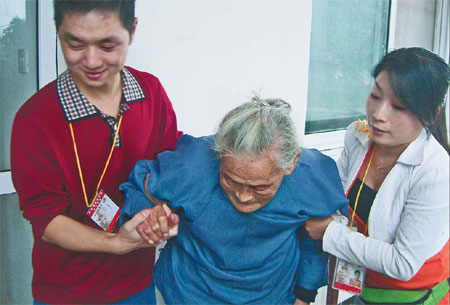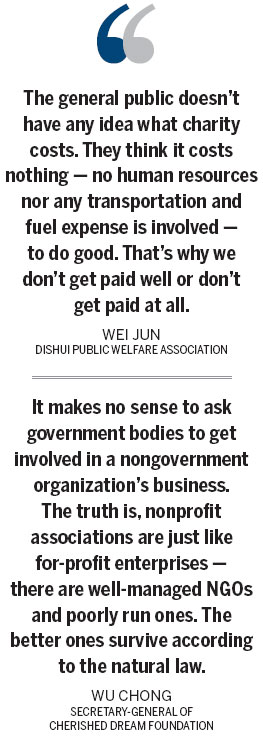Providing charity not free
Updated: 2011-11-18 11:52
By Shi Yingying (China Daily European Weekly)
|
|||||||||
|
 Volunteers from Dishui association help a woman walk to the courtyard at an old people's home in Anji, Zhejiang. [Provided to China Daily] |
Amity Bakery in Nanjing hires mentally disabled people as employees, and its financial supporter, Amity Foundation, earmarks 10 percent of each donation for overhead, says general manager Zhu Guangquan. "It's very common in foreign countries, but some Chinese donors don't understand it and they question it."
Grassroots NGOs are not covered by China's regulation on foundations, but it provides a guideline. And the regulation says foundations can spend up to 10 percent of donations on expenses.
One billionaire from East China's Fujian province challenged the rule by pushing the bottom line. In May 2010, Cao Dewang donated 200 million yuan ($31.5 million) for five drought-affected provinces in Southwest China on one condition - that overhead be kept within 3 percent. Cao sent a team to monitor the money distribution.
One result was that China Foundation for Poverty Alleviation, which administered the donation, paid for any expenses over 3 percent. The foundation has government support, so "it could afford such a loss, but we can't," Wei says. "So it is with China's grassroots NGOs."
Supporting voices
Those NGOs are not fighting alone.
Nonprofits should pay their people as much as their for-profit peers, says Dan Pallotta, a US expert in innovation for nonprofits and author of Uncharitable: How Restraints on Nonprofits Undermine Their Potential.
"They should be able to spend what they need to (for) administration and fundraising. And donors need to stop measuring nonprofits on a simplistic formula that wrongly places success on low overhead instead of impact," he says in a US speech.
That philosophy won't catch on in China anytime soon, judging from response to Xu's call for NGO salary increases. Within a few days of posting his plea, Xu receives 102 comments online, about half "unfriendly". A common theme was, "Get out of the nonprofit profession if you're after fame and fortune."
 |
Li Xinzhao of Beijing, who writes social commentary for newspapers, tells China Daily, "Our society insists that charity is supported by moral conduct, rather than a full-time job that requires human resources and requests certain payback. Philanthropy in China is kidnapped by this ethic ... We think it's wrong for nonprofit professionals to earn good money."
Only changing people's mindset on this issue can improve the situation, she says.
Sustainability
Wu Chong is secretary-general of Cherished Dream Foundation, which helps children in remote villages where the schools are poor. When he hears that some grassroots NGOs are calling for a minimum wage, he shakes his head.
"It makes no sense to ask government bodies to get involved in a nongovernment organization's business," he says.
"The truth is, nonprofit associations are just like for-profit enterprises - there are well-managed NGOs and poorly run ones. The better ones survive according to the natural law."
The key word, he says, is "sustainable". He knew that from his years in real estate and investment banking.
"I had Cherished Dream's five-year-plan in my head when I decided to build it," he says. "How to raise funds, how many people do I need, how big the office should be and the plan of expansion - I got all of these questions figured out ahead of time."
Liu Yonglong confesses that when he started Grassroots Community 11 years ago, he had no idea it would turn into an actual NGO, much less "still exist after all these years. Some later-established NGOs have advantages in terms of sustainability" because they have seen good models and bad, he says.
It might be true for Zhang Yichao, 34, who founded Jiuqian, a center that provides free extracurricular education for migrant students in Shanghai.
"At the current stage, I'm trying to convince some of our company donors to take our students as interns," Zhang says. "If they're able to impress their bosses and stay there, I believe in the near future, they will return to Jiuqian as volunteers and may bring in more funds."











